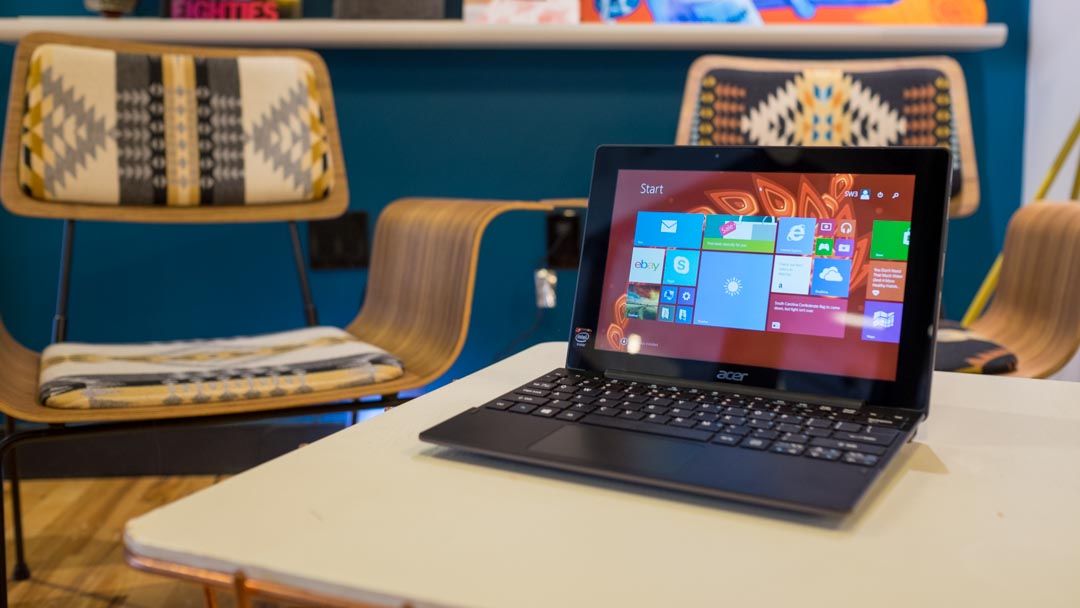TechRadar Verdict
With a long-lasting battery and underwhelming hardware, the Acer Aspire Switch 10 E has plenty of lasting power, but lacks the punch to make good use of it.
Pros
- +
Small and portable
- +
Keyboard includes extra storage
- +
Multiple color options
Cons
- -
Very underpowered
- -
Major screen glare
- -
Doesn't deliver promised battery life
Why you can trust TechRadar
The Acer Switch 10 E ($349 in the US while not being available in the UK and Australia in this exact skew) dives into a veritable ocean of shiny, new 2-in-1 notebook computers ready for Windows 10. Pioneered by the Microsoft Surface 3 and others, the new hybrids further refine the mixture of tablet convenience and laptop productivity.
This latest model from Acer competes with convertibles such as the Asus Transformer Book T100 Chi and the Dell Venue 11 Pro 7000, only the Switch 10 E is more budget minded. That being the case, it's light on both performance and features, but compensates with high portability and long battery life.
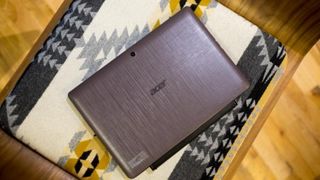
Design
Following the Surface 3's lead, the Switch 10 E is a Windows 8.1 tablet that attaches to a keyboard base. Together, the system weighs in at 2.82 pounds (1.27 kg), while the tablet by itself is 1.39 pounds (0.63 kg). Not the lightest 10.1-inch notebook around, but it's within the range of comparable systems, and the tablet is a tad lighter than the 1.6 pound (0.72 kg) Dell Venue 11 Pro 7000. Nevertheless, I spent a good deal of time commuting with the notebook tucked in my backpack and barely noticed its weight.
The tablet portion has a 64GB SSD built-in, which seems like a decent amount. That is, until you realize that between Windows 8.1 and the pre-installed software, over half its storage is used up right out of the box. Attaching the keyboard base adds an additional 500GB hard drive, which is great. But, being that it's external storage, you wouldn't necessarily want to install applications onto it.
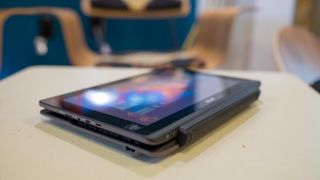
There's a relatively sturdy connection between the tablet and the base, although there were a few occasions when the two accidentally came apart when I didn't pick it up or open it correctly. The notebook also has a tendency to fall over backwards when the screen is tilted too far.
Otherwise, the computer is pretty solid and comfortable to type on. I like being able to flip the screen around into Display mode to watch movies or to do some reading. However, the keyboard's small trackpad isn't always responsive. Shortly after the system wakes up, the touchpad doesn't register movements or clicks for a few seconds.
No frills switch
Apart from the micro-HDMI port, which lets you hook the tablet up to a large screen monitor or TV for watching movies, the Aspire Switch 10 E is pretty light on features. There is a single microSD card that supports up to 128GB of memory for extra storage, which is pretty standard for most 2-in-1 systems. However, there is no full-size SD card reader on neither the tablet nor the keyboard.
Although the keyboard has a much appreciated 500GB hard drive built in, it too is pretty bare bones. There are no backlit keys, and it sports only a single USB 2.0 port. So, you'll be stuck waiting for a long while if you plan on moving a large number of files from a flash drive to the hard drive. The similarly unimpressive speakers need to be turned up all the way to hear anything at a reasonable volume, which means that either headphones or an external speaker is needed to enjoy videos.
Meanwhile, the most worthwhile aspect of the Switch 10 E is its battery life, which is supposed to last up to 12 hours. Although it might reach that mark with light everyday use, our benchmarks estimate that it doesn't even reach half that with continuous intensive use unless you stick with using it in tablet mode. Even then, it doesn't even reach 10 hours of battery, which has been the standard set by the iPad Air 2 and Nexus 9.
I found the Aspire Switch 10 E to be very light and portable. I traveled for hours with it tucked in my backpack and hardly noticed it, even during lengthy walks. That said, our initial impressions found it to be heavier than competing 2-in-1 notebooks, and this is true when the optional keyboard is attached.
The tablet by itself weighs 1.39 pounds (0.63 kg), which is a little lighter than the Dell Venue 11 Pro 7000 (1.6 pounds or 0.73 kg), but a tad heavier than the Asus Transformer Book T100 Chi (1.25 pounds or 0.57 kg).

However, adding on the keyboard will bump the weight of the Switch 10 E up to 2.82 pounds (1.27 kg), which makes the Switch 10 E considerably heavier and thicker compared to its competitors. Though, I consider it a fair trade, considering the 500GB hard drive inside – plus, it acts as a nicely weighted base.
Specifications
Here is the Acer Aspire Switch 10 E configuration sent to TechRadar for review:
Spec Sheet
- CPU: 1.33GHz Intel Atom Z3735F (quad-core, 2MB cache, 1.83 GHz with Turbo Boost)
- Graphics: Intel HD Graphics
- RAM: 2GB DDR3L SDRAM
- Screen: 10.1-inch, 1,280 x 800 IPS 10 multi-touch display
- Storage: 64GB SSD (tablet), 500 GB 5400 RPM SATA Hard Drive (keyboard)
- Ports: (On tablet) Micro USB 2.0 Port, Micro-HDMI port, MicroSD memory slot, Headphone jack. (On keyboard) USB 2.0 Port.
- Connectivity: 802.11n Dual-Band Wireless LAN w/ MIMO Technology, Bluetooth 4.0
- Camera: 2MP front-facing camera; 2MP rear-facing camera
- Weight: 1.39 pounds; 2.82 pounds with keyboard
- Size: 10.31 x .43 x 7.09 inches (W x D x H); 10.31 x 1.01 x 7.09 with keyboard
You probably aren't expecting much from a $349 system, and in this case you'd be right not to. The notebook falls short in most areas, particularly with its low resolution (1,280 x 800) screen. Add a paltry 2GB of memory, an Intel Atom 1.33 GHz processor, a 32-bit version of Windows 8.1, and a single USB 2.0 port built into the keyboard (the tablet half has a Micro USB 2.0 port), and you have a ridiculously under powered system.
Only the 32GB model is available in the UK right now, which retails for £279, and the notebook is not yet available in Australia. Instead, Aussies can pick up the higher-end model Aspire Switch 10 (minus the "E"), which packs a higher-resolution 1,920 x 1,200 display and a fancier Gorilla Glass 3 shell, for AU$649.
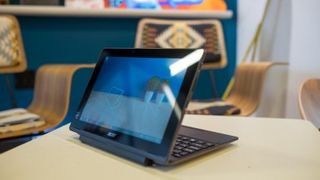
The Asus Transformer Book T100 Chi is similarly priced for $349 (£349, AU$399). It also has comparable, if not better, performance, and includes a high resolution (1,920 x 1,200) screen. Considering how the Asus Transformer Book T100 Chi offers more power and goes for around the same price, it's hard to justify putting up with all the Acer Switch 10 E's shortcomings for a bit more storage.
As much as I like the Switch 10 E's keyboard storage solution, you'd do just as well picking up a fuller featured 2-in-1 for the same price and shelling out some extra money for an external hard drive.
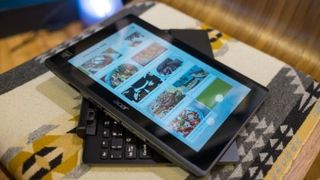
The Dell Venue 11 Pro 7000 is the most expensive of the group, with a price tag that starts at $699 (£599, AU$1,350) without a keyboard, but has a better set of hardware and features.
Designed primarily for students and light entertainment, the Aspire Switch 10 E emphasizes its battery life while downplaying some of its low-performance hardware. This mostly includes quick, on-the-go activities, like responding to email, word processing, watching streaming video and Skyping friends.
That's about the upper limit of computing you'll do with the Switch 10 E. Thanks to its low end graphics chip and CPU, this machine is not capable of most PC gaming.
Benchmarks
Here's how the Acer Aspire Switch 10 E performed in our suite of benchmark tests:
- 3DMark: Cloud Gate: 1,164; Sky Diver: 445; Fire Strike: N/A
- Cinebench CPU: N/A; Graphics: N/A
- PCMark 8 (Home Test): 1,091 points
- PCMark 8 Battery Life: 5 hours and 38 minutes (w/ keyboard); 7 hours and 44 minutes (tablet)
Although benchmarks show that the Aspire Switch 10 E has a decent battery, it falls flat in just about every area. The notebook comes with the 32-bit version of Windows 8.1, even though the processor is capable of running at 64-bit, which both hinders the system's performance and prevented me from being able to run Cinebench. Not even the 3DMark Fire Strike benchmark could complete.
Scores for the remaining tests don't look very good. Both the Transformer Book T100 Chi (Cloud Gate: 1,404; Sky Diver: 562; PCMark 8: 1,217) and Dell Venue 11 Pro 7000 (Cloud Gate: 3,706; Sky Driver: 1,862; PCMark 8: 2,141) outperform the Switch 10 E at every level. What's worse, the Transformer Book T100 boasts an 8 hour 38 minute battery life that far exceeds that of the Switch 10 E, even when its keyboard isn't attached.
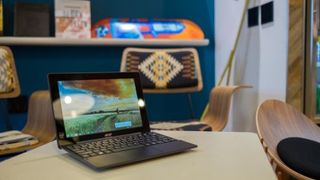
Both competing notebooks outperform the Switch 10 E, and the Transformer Book T100 Chi has a slightly lower price tag. The Dell Venue 11 Pro 7000 costs significantly more, but the superior hardware and features of Dell's tablet-laptop more than make up for the price difference.
Low Expectations
With a resolution of 1,280 x 800, the screen only barely qualifies as HD. Furthermore, it has a terrible glare, so forget about using it in open sunlight. I can hardly see a thing taking this machine outside, and even overhead fluorescent lighting can be bothersome.
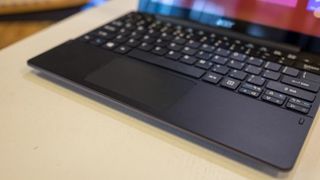
That said, the hybrid nature of the removable display is pretty good for streaming movies and shows – so long as you keep it indoors, that is. Unfortunately, the speakers are barely audible unless they're at max volume. So, you'll need to pair it with a wireless Bluetooth speaker or put on headphones to hear anything.
Big battery, little use
What's supposed to make the Switch 10 E worthwhile is its battery life, which is rated to last up to 12 hours, depending on use. However, our benchmark tests show that it doesn't nearly live up to that promise.
The laptop ran the PCMark 8 benchmark for 5 hours and 38 minutes with the keyboard attached. Using it as a tablet alone extends run time to 7 hours and 44 minutes, but it still isn't close to the 12 hour mark Acer flaunts for this 2-in-1 machine.
In my own testing, this notebook gave me about 10 hours of on-and-off use, mostly for word processing, email, web browsing and streaming video through Chrome, with 30% battery to spare by evening time. With continuous usage, however, the Acer Switch 10 E's total battery life winded down to 10% capacity in 4 hours and 44 minutes.
The Switch 10 E has the potential to deliver a full day's worth of use. Though, given its specifications, there's not a whole lot to do with the notebook to put a big drain on the battery life.

While the modest hardware can extend battery life with low power consumption, it also limits the types of applications you can run. This is a significant trade-off, one that I don't think is worthwhile. The experience is a lot like working with a Chromebook, but now you're held back by limited processing power instead of a shoddy Internet connection.
Unfortunately, this same battery also takes forever to charge, especially when the notebook remains in use or is left in sleep mode. It takes almost three hours to fully charge the tablet from 30 percent, even with the system is shut down. This is largely thanks to the fact that the tablet uses a micro USB port and 2-amp charger typically used to juice up less power hungry Android devices.
Bundled software
- Microsoft Office 365 - The notebook includes a one-year subscription to Microsoft Office 365, which includes access to applications like Word and Excel.
- abPhoto - Automatically backup your photos to the cloud, where they can be organized and shared across multiple PCs and mobile devices.
- abMedia - A music and video cloud streaming service, which is allows users to access their media from both iOS and Android devices.
The intentions behind the Acer Aspire Switch 10 E are admirable. It's a budget 2-in-1 notebook that emphasizes portability and long-battery life. But it sacrifices much in the way of performance and features for some modest gains.
Perhaps the underpowered hardware would be forgivable if the notebook itself were more usable. But with the low resolution of the screen coupled with high glare, weak speakers, limited ports and long recharge time, the Switch 10 E isn't exactly a go-to device for work or entertainment, especially for students who need a rig ready to go.
We liked
My favorite part of the notebook is the detachable keyboard. While it isn't even really part of the system, the detachable keyboard adds an integral 500GB hard drive tucked inside. I also like the solid typing experience and how it gives the notebook a relatively sturdy base – just don't tilt the screen too far back.
We disliked
The laptop offers subpar performance compared to some of its competitors, and is pretty light on features. Its screen has a terrible glare that makes it hard to use under many lighting conditions, and its built-in speakers are pretty weak, making the Switch 10 E a less-than-ideal choice for watching videos. Worst of all, the notebook doesn't come close to delivering on its "12 hours of battery life" promise.
Final verdict
When it comes down to it, the Acer Aspire Switch 10 E doesn't offer performance or enough features to make it a worthwhile. Its low-brow hardware, an Intel Atom processor and barely HD display don't measure up against its competitors. Beyond that, the battery, which is supposed to last for 12 hours, is beaten in benchmarks by the Asus Transformer Book T100 Chi , and it takes forever to recharge.
There are a lot of 2-in-1 system out there, many with better performance and features for almost the same price as the Switch 10 E. The added storage built into the detachable keyboard gives the system a small advantage, but a little extra hard drive space isn't anything to brag about.
While the little notebook is handy to have around when you're on-the-go, it simply doesn't measure up, and it's not worth a second glance.
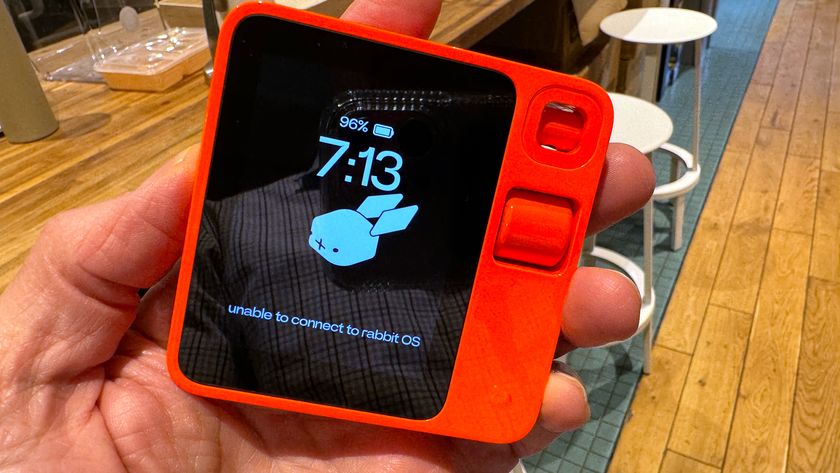
With the Humane AI Pin now dead, what does the Rabbit R1 need to do to survive?

From Peaky Blinders to Rocky, the movies and shows that the cast of A Thousand Blows watched ahead of the new Disney+ drama’s release

One of the best AI video generators is now on the iPhone – here's what you need to know about Pika's new app
Most Popular




